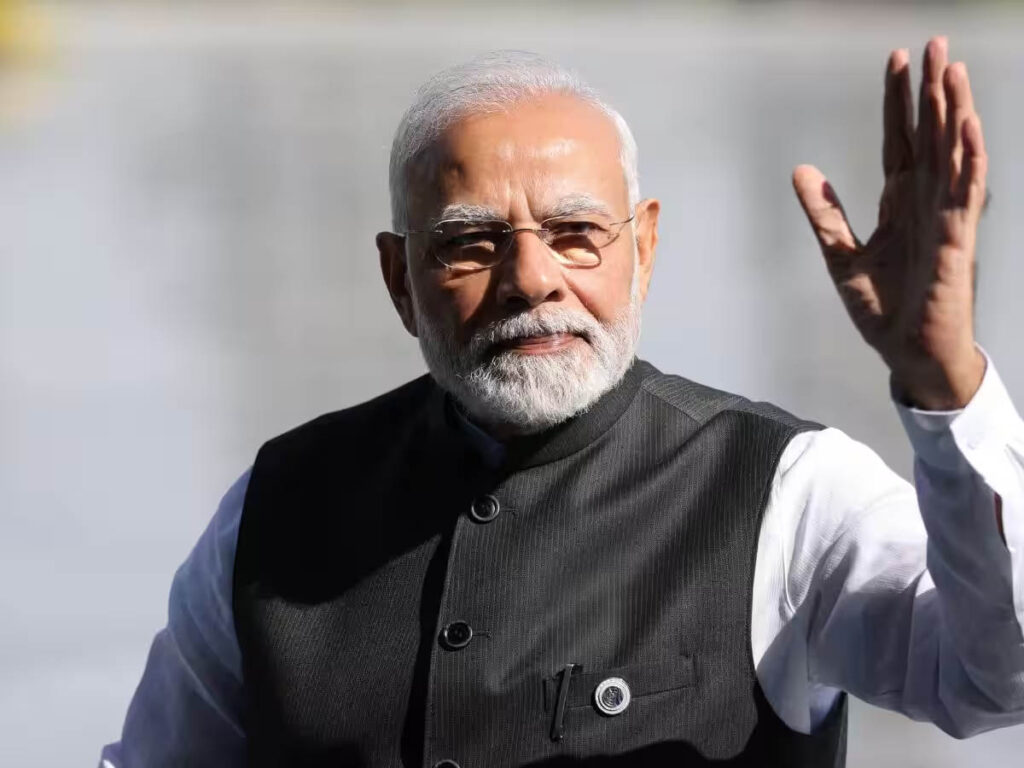
Narendra Modi
"An Indian politician who has served as the 14th Prime Minister of India since May 2014."
Narendra Modi, in full Narendra Damodardas Modi, (born September 17, 1950, Vadnagar, India), Indian politician and government official who rose to become a senior leader of the Bharatiya Janata Party (BJP). In 2014 he led his party to victory in elections to the Lok Sabha (lower chamber of the Indian parliament), after which he was sworn in as prime minister of India. Prior to that he had served (2001–14) as chief minister (head of government) of Gujarat state in western India.
Early life and political career
Narendra Modi was raised in a small town in northern Gujarat, and he completed an M.A. degree in political science from Gujarat University in Ahmadabad. He joined the pro-Hindu Rashtriya Swayamsevak Sangh (RSS) organization in the early 1970s and set up a unit of the RSS’s students’ wing, the Akhil Bharatiya Vidyarthi Parishad, in his area. Narendra Modi rose steadily in the RSS hierarchy, and his association with the organization significantly benefited his subsequent political career.
Narendra Modi joined the BJP in 1987, and a year later he was made the general secretary of the Gujarat branch of the party. He was instrumental in greatly strengthening the party’s presence in the state in succeeding years. In 1990 Narendra Modi was one of the BJP members who participated in a coalition government in the state, and he helped the BJP achieve success in the 1995 state legislative assembly elections that in March allowed the party to form the first-ever BJP-controlled government in India. The BJP’s control of the state government was relatively short-lived, however, ending in September 1996.
PM Narendra Modi launches various development
Medical Health Care Centers
“India's goal is to make healthcare accessible and affordable, not only for our citizens but for the whole world,” said Prime Minister Narendra Modi. “Health assurance is not a scheme. It is about ensuring that every rupee spent on health is well spent; that every citizen has access to proper healthcare”
Economical Stability
Prime Minister Narendra Modi has said that India's economic growth is a “natural by-product” of his nine-year-old government's political stability, as he expressed optimism that it will be a developed nation by 2047 with "corruption, casteism and communalism" having no place in our national life.
Prioritizing the most vulnerable
The prime minister said efforts should be put to build an inclusive food system that focuses on the world's most vulnerable people, especially "marginal farmers should be our priority". "It is necessary to democratise technology. Technology can become a bridge between development and democracy," he said.
Educational Environment
PM Modi underscored the significance of instilling curiosity in students, especially regarding science and technology, as the 21st century is marked by rapid technological advancements. He stressed the importance of preparing the youth for the future through skill development.
Campaign is power
Total Volunteer
Campaigns
Vote Papers
Coverage Area
OUR history
Know more about
Describe the organizational structure of a major modern country
# Let's Grow India
Together We can
We can’t describe its greatness in one line; India is a land of spirituality and divine.
Our Mission & Vision
Nai Soch Nai Ummeed
"Sab Ka Saath, Sab Ka Vikas"

Education & Job Opportunities for Youth
Narendra Modi's initiatives like Skill India, Make in India, and Digital India aim to provide education and job opportunities for India's youth, fostering skill development and digital literacy.
Inflation/Price Control
Narendra Modi's government has employed measures like the Pradhan Mantri Jan Dhan Yojana and direct benefit transfers to address inflation and provide financial relief to vulnerable populations.
Children & Women's Empowerment
Narendra Modi has launched schemes like Beti Bachao Beti Padhao and Sukanya Samriddhi Yojana to empower women and promote their rights, as well as prioritizing child welfare and education.
Women Rights
Narendra Modi's administration has taken steps to enhance women's rights through initiatives like Beti Bachao Beti Padhao, Triple Talaq ban, and promoting women's participation in various sectors.
Urban Development Intrastructure
Narendra Modi's Smart Cities Mission and AMRUT scheme focus on modernizing urban infrastructure, improving basic services, and enhancing the quality of life in India's cities.
Focus on Education
Narendra Modi has prioritized education through schemes like Digital India, Skill India, and initiatives for school infrastructure improvement, aiming to enhance access and quality of education in India.






